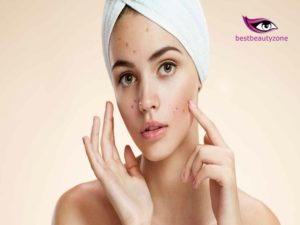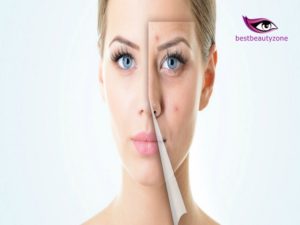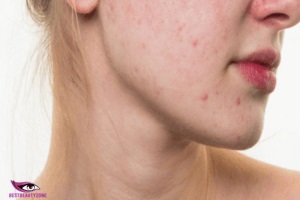Acne Scars hits just about everyone in their lives at one or another point. The majority of people complain of the pop up of acne at the most inconvenient times like before party, date, or work presentations, and all wondering do acne scars go away?
But what exactly causes acne? When pores or hair follicles on your skin get clogged by oil and dead skin cells, forming comedones causes acne. The bacteria here start growing, causing red bumps and inflammation. This acne then sometimes leaves you with unpleasant acne scars. People with acne scars always have a question- Any tips on getting rid of acne scars?
Mostly, the light red or brown marks formed by healed acne vanish overtime on their own. But severe cystic acne is likely to leave permanent scars as it heals.
Permanent scarring generally develops when acne is picked or squeezed instead of treating it or allowing it to heal.
Some people don’t get any acne scars. But most people have at least a few acne scars at some point in their lives. The type of acne scars developed depends on the type of acne you develop and how you treat it.

Types of acne scars
Atrophic scars
Atrophic scars are usually caused by severe cystic acne. These types of scars are flat with shallow depression that heal inside the top layer of skin.
How these atrophic acne scars appear can vary depending on a person’s history with acne. There are majorly three types of atrophic scars:
Boxcar scars
These scars are with box-like indentations that are broad and have sharply defined edges. Widespread acne, chickenpox, or varicella, a virus causing a red, itchy rash with blisters cause boxcar scars.

Ice pick scars
Ice pick scars, smaller and more narrow marks that point down into the skin’s surface. Develop commonly on cheeks.
Rolling scars
Scars with varying depth and sloped edges, makes skin appear uneven.
Hypertrophic and keloid scars
Hypertrophic and keloid scars form as raised lumps of scar tissue at the place the acne was. This type of scars develops when the scar tissue builds up from previous acne spots.
Hypertrophic scars are the same as their acne size. Keloid scars develop a larger scar than their acne and spread beyond the sides of the original spot.
Post-inflammatory hyperpigmentation
A darker or discolored patch of skin formed when acne heals. that is not a scar and will heal on its own with a good sun protection regimen.
Hyperpigmentation occurs when the skin gets damaged with the severe acne or the acne gets picked up.
The skin damage heals over time with proper sun protection.
How to get rid of deep acne scars

There are many acne scar treatment products available in the market but seeking help with a dermatologist is the best way one can fix acne scar on back, face, chest, and other parts of the body.
Treatment for atrophic scars
Boxcar, ice pick, and rolling scars involve two stages of treatment, the first stage reduces the depth of the scars to even the surface while the second reduces discoloration. This is how to get rid of old acne scars.
In the first stage dermatologist follow one or more of the following treatments:
- Acne scars peeling treatment with chemicals
- Dermabrasion
- Dermal fillers
- Laser therapy
- Microneedling
- Punch excision
- Punch grafting
- Subcision
- TCA Cross (chemical reconstruction of skin scars)
In stage two dermatologists follow up with more chemical peels, laser therapy, and provide recommendations for sun protection. Dermatologists use the best acne scar removal products in both stages.
Treatment for hypertrophic and keloid scars
In this treatment, the major focus is on reducing the height of scars. This treatment is done to make the skin look smoother.
A dermatologist performs one or more treatment to reduce the hypertrophic and keloid scars:
- Steroid injections
- Surgical removal
- Laser therapy
Treatment for post-inflammatory hyperpigmentation
Dermatologists focus on preventing further skin darkening and allow it to naturally recover over time.
A dermatologist performs following treatment for hyperpigmentation:
- Chemical peels
- Laser therapy
- Hydroquinone
- Prescription topical retinol and retinoids, that increases the production of collagen in the skin and even out the tone as well as lighten the dark spots.
- Acne scar moisturizer
A number of treatments are available for different types of acne scars. If you’re finding the best ways to heal acne scars or how to fade acne scars, see your dermatologist develop a treatment plan that’s most suitable for you. Observe the acne scar before and after the treatment.
For more such beauty updates beside this one that talking about do acne scars go away, follow Best Beauty Zone!










